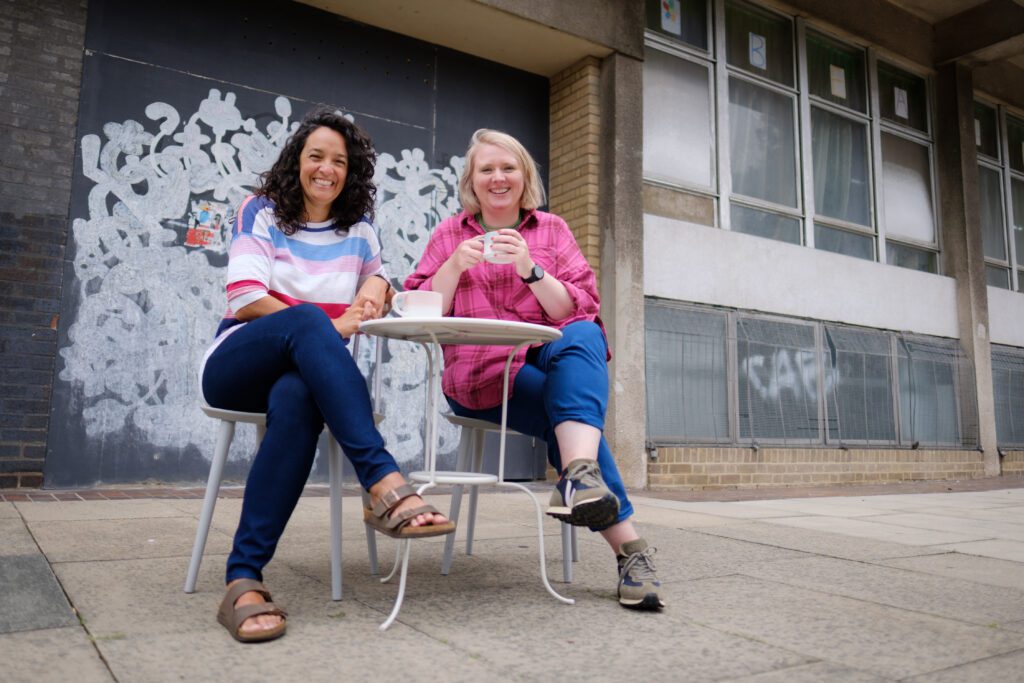Based on a true story of two bodies found off the coasts of Norway and the Netherlands wearing identical wetsuits, this curious news story briefly made headlines in 2015. It caught the eye of Belgian playwright, Freek Mariën who was inspired to write The Wetsuitman which will have an exclusive one week run at the Arcola.
After being performed in Antwerp and New York, The Wetsuitman premiered in Hackney’s Rose Lipman Building in 2022, courtesy of the micro-theatre company, Foreign Affairs. Now, audiences have another chance to see this remarkable play. Here, the co-artistic directors at Foreign Affairs, Camila França and Trine Garrett speak with Nilgin Yusuf, Senior Reviewer at London Pub Theatre Magazine.
How would you describe The Wetsuitman and what can audiences expect?
TG: It’s a play inspired by a Norwegian newspaper story, a blend of factual events with the artistry of a playwright’s perspective. Without giving too much away, audiences can expect to be surprised, moved and provoked. The play encourages us to contemplate our world and society; the stark reality of countless people resorting to desperate measures in search of refuge. I think the play asks us how we can respond to this reality.
Since 2010, Foreign Affairs has produced numerous English language translations for theatre. Can you say something about the role of translation in bringing this work to UK audiences?
CF: We discovered The Wetsuitman through David McKay, a translator who took part in our Theatre Translator Mentorship programme and fell in love with it.
His translation captured the play’s unique rhythm and poetic essence providing us with a powerful and sensitive rendition. I was captivated by the poetic text and its emotional journey. Each act drew me in deeper, leaving me immersed and moved.
TG: Each play translation demands something different from the translator. It’s not just about translating words, but understanding the original and new context, content and dramaturgy. The theatre translator must be sensitive to the craft of making theatre. The Wetsuitman is culturally complex. Written by a Belgian playwright, the play is located in Norway, the Netherlands, France and Syria. David McKay, a seasoned translator, has navigated these complexities beautifully and, we are proud to have supported his work through our mentorship programme. Added to the multicultural ethos of Foreign Affairs, this production weaves together a real tapestry of cultures.
Trine, as a director, what attracted you to The Wetsuitman and what were the challenges of staging the work?
TG: Three things attracted me. First, it’s an actor’s dream (or at least, I believe so as an actor myself). Three actors play twenty-eight characters between them which offers a fantastic opportunity to test and showcase an actors’ craft. Secondly, the play’s structure is ingeniously designed, like a clever machine. As the story unfolds, it draws the audience in and surprises them with unexpected twists and turns. Finally, the very human story, both urgent and relevant, touched my heart.
One of the most significant challenges we faced was how to tell a story that wasn’t our own. Our approach centred around the collaborative efforts of our cast and team, many of whom had their own experiences of migrancy. The play, based on a true story, also explores the meta-narrative of how stories are told. This provides the opportunity to be creative in our attempt to share this story in our own, unique Foreign Affairs way.
Another challenging aspect is the heart-breaking story at the play’s core which touched me profoundly. At times, it has been emotionally demanding to be present during rehearsals. However, I believe this emotional connection is essential for the play’s power.
And Camila, what have been the creative rewards of producing The Wetsuitman?
CF: A play like The Wetsuitman presents a tough, tricky, uncomfortable topic. It reminds us to take a second look at what we think we know and consider how we feel about the subject. It’s unsettling, but that’s where the real growth starts. Sometimes it starts with a small spark during a play and grows into something that seeps into everyday conversations and might even shift how we see the world.
The Wetsuitman is cross-genre and constantly surprises the audience who become active participants in attempting to solve a puzzle. Is this part of the play’s appeal?
CF: The power of a good mystery lies in its ability to draw the audience in. From the very beginning, the audience is invested in an unanswered question and looks for clues. The audience becomes part of the story as they strive to put the pieces together.
TG: What makes The Wetsuitman so engaging is how it combines different approaches to storytelling – or theatre-making – and keeps surprising the audience. It hooks us from the start like a good crime novel, as we follow the investigation and journey to solve the mystery. And it doesn’t stop there – this play leaves people thinking and talking about the story and its themes for days, weeks or months after they’ve seen it.
There have been many plays about the migrant experience. What made The Wetsuitman stand apart?
CF: The attention to detail in the play text, makes it incredibly authentic, and allows us to connect with the story at a deep level. It isn’t just another anonymous narrative in the news, an isolated ‘incident’ or statistic.’ It’s deeply personal and delves into individual anecdotes, emotions, and relationships that echo our personal experiences and those around us. Through this play, we unite as humans. It’s not ‘us’ and ‘them’ but the sense we are all in this together. As a parent, the family dynamic touches me every time I watch it.
TG: Working on the play and staging it against the backdrop of current migration and refugee-related policies and news in the UK, had a deep effect on all involved. The play moves through the Calais Jungle and war-torn Syria and sheds light on the harsh realities that people in these situations face. It really made me think about what the latest newspaper headlines cannot communicate. Sensationalism and racism shape how these stories are presented in the media and discussed in policy. By delving beneath the surface, the play urges us to consider the intricate challenges encountered by migrants and refugees, both in their personal journeys and in a wider societal context.
Some parts of The Wetsuitman are rigorously researched and others imagined. How do you orchestrate or frame this as director and producer?
TG: For me, it became evident that our production of The Wetsuitman was not just about the story, but about the many approaches to storytelling. I always envisioned each act as a distinct exploration, like different tools in a toolkit, guided by the writing itself. From spoken word to choreographed movement, every act has a different approach. Some feel frenetic and chaotic, others have stillness and the depth of a photograph. The concept Deema, our cultural dramaturg and embedded critic shared, which serves as a unifying thread (primarily for us working on the play), was that of a kaleidoscope – a continuous twist that reveals the next image.
CF: As a producer, I aim to nurture the process, ensuring all the moving parts harmonise. This project is a true organic partnership that brings together research and imagination in a symphony of storytelling.
Given the serious nature of The Wetsuitman, another surprise is some parts are very funny. Can you say something about the role of humour when constructing such a dark story of our times?
TG: The humour serves two functions. First, it lures and disarms the audience during Act I as it riffs on the familiar genre of Nordic Noir. We’re laughing, but then suddenly it isn’t funny anymore. Secondly, I think the humour serves to amplify the darkness. The lighter moments, or moments of comedy, make the darkness of the story – the reality of so many people – even more overwhelming.
Will the original ensemble cast from Rose Lipman production be reunited for this production? What were the influences on casting decisions?
TG: We are thrilled to have the same cast on board. I can’t imagine the production without them. They are essential to the show. When it came to casting, we were already familiar with the three actors. Eugenia Low is a member of our ensemble, and we had recently worked with Youness Bouzinab and David Djemal. As a small company with a strong ensemble approach, we focused on finding actors who could work well together, effectively tackle the task at hand, and genuinely bring all 28 characters to life. Their ability to delve into the play’s themes in a truthful and meaningful way was key.
Why is The Wetsuitman an important play?
TG: Because it reminds us of the human stories behind the headlines, behind the government portrayal of migrants and refugees, and the media discourse. It also indirectly places us – the audience – at the centre of the action, so that we question what kind of world we live in.
And why here, at the Arcola?
CF: This was an amazing opportunity that unexpectedly crossed our path. Arcola’s unique history as a paint factory resonated with our practice of presenting our work in unconventional spaces; a perfect fit! As a company known for its trailblazing work and international outlook, Arcola is like an ‘older sister’ we look up to. We’re thrilled to have the opportunity to connect with our ‘neighbours’ and to share our work with new audiences.
What would you like audiences to take away from The Wetsuitman?
TG: The first is the story of the two people who tried to cross the channel from France to the UK in the search of a better, safer life; people with hopes and dreams, families and friends.
I hope audiences will also leave with an insight into theatre with a global outlook through translation and a brilliant team of migrant, UK-based theatre-makers and artists coming together to make theatre that is both relevant and memorable.
CF: I would like them to leave with a sense of compassion, a greater appreciation for our shared humanity, a willingness to extend kindness, and a curiosity-driven openness to engage in meaningful conversations about the themes and issues explored in the play.
The Wetsuitman will be at Arcola Theatre for an exclusive one-week run from Tuesday 29 August to Saturday 2 September, 2023.


